2019 Chinese Returned Scholars Innovation and Entrepreneurship Forum explores the role of Chinese returnees in the new era
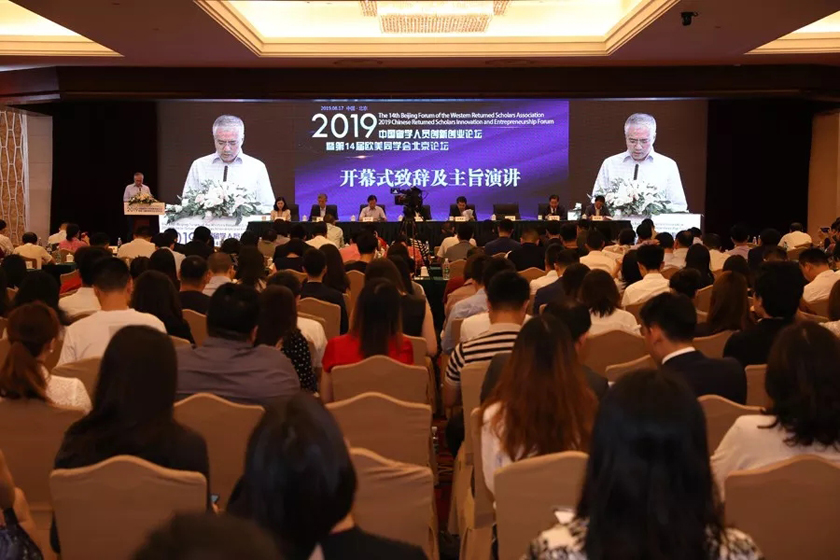
In the current age, when globalization is subject to various uncertainties, Chinese overseas returnees play a vital role in China’s development.
On August 17, the Western Returned Scholars Association (Overseas-educated Scholars Association of China) and the Center for China and Globalization (CCG) held the 14th Western Returned Scholars Association Beijing Forum & 2019 Chinese Returned Scholars Innovation and Entrepreneurship Forum in Beijing, China.
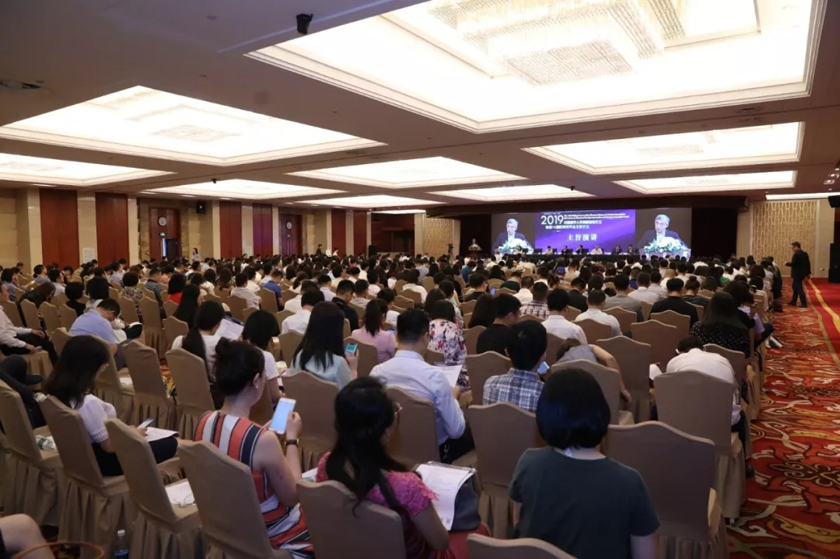
The forum, based on the theme “70th anniversary of the founding of the People’s Republic of China (PRC) -Opportunities and Challenges for Overseas Students in the New Era”, brought together more than 50 well-known Chinese and international company executives, leading entrepreneurs, experts and around 800 Chinese returned scholars to discuss numerous topics, such as the role of Chinese overseas returnees in the digital era, global talent flows, global talent competitiveness, employment and entrepreneurship, talent development and innovation in the Great Bay Area, challenges and opportunities of the Belt and Road Initiative (BRI).
As an annual event for overseas Chinese returnees, the Western Returned Scholars Association Beijing Forum & Chinese Returned Scholars Innovation and Entrepreneurship Forum are the highest-profile and most influential international talent innovation and entrepreneurship forums in China.
2019 marked the 14th year of the forum, which consisted of four plenary sessions and a licensing ceremony for Research Bases for International Student Internships.
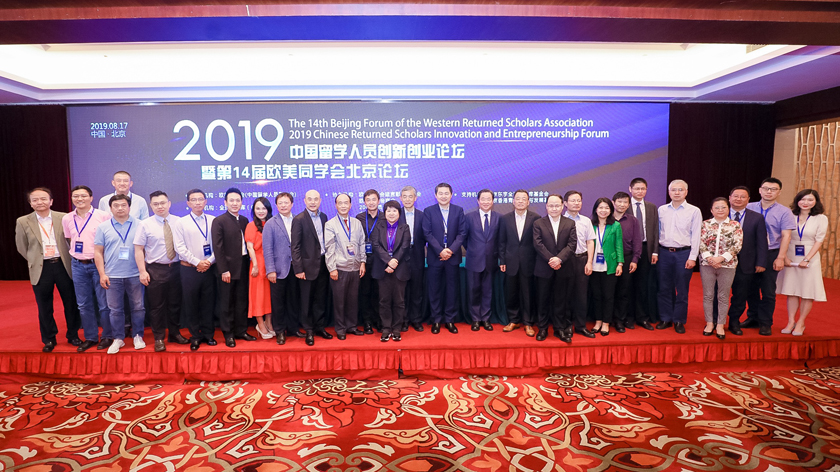
Promoting the development of innovation and entrepreneurship in new era
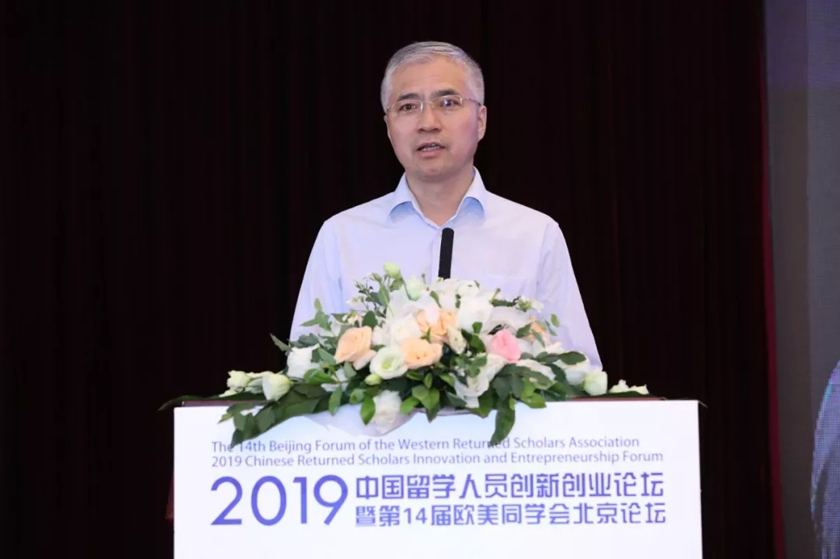
Li Jinsheng, deputy director of the Ministry of Human Resources and Social Security (MOHRSS) of the People’s Republic of China (PRC), pointed out that the forum provides an important communication platform for the overseas returnees.
Li said that MOHRSS has been continuing to improve relevant policies and projects on employment and entrepreneurship for overseas students returning to China, and attracting more international talents.
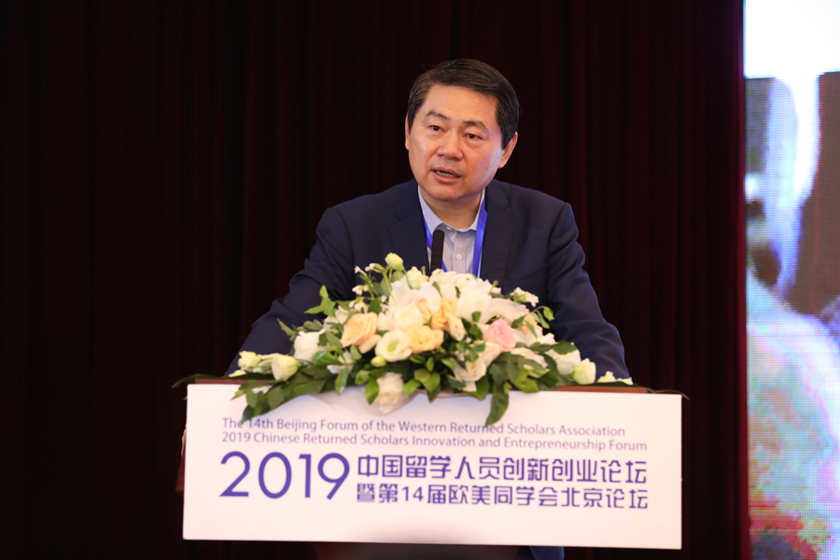
Wang Huiyao, president of CCG, vice chairman of the China Western Returned Scholars Association (WRSA) and counselor to China’s State Council, noted that international students returning to China have played a vital role in integrating insights of the East and the West since 1847 when China’s first foreign students went to the US to study.
Wang said that Chinese overseas returnees have positively shaped and contributed to many aspects of contemporary Chinese society, such as perspectives on development, politics, science and technology, industry and education.
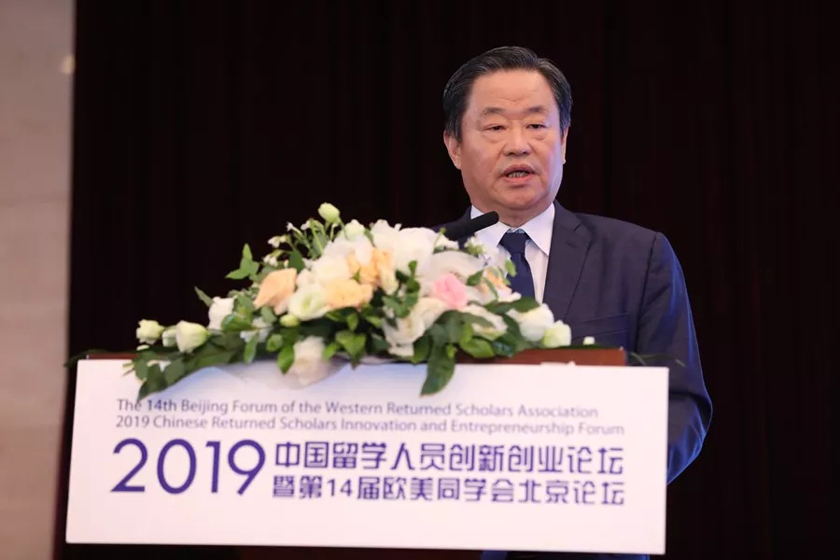
Ning Gaoning, chairman of Sinochem Group, said that overseas returnees should learn how to coordinate different systems regarding society and culture, while society should provide an open, inclusive and international environment for them.
As China’s global status and competitive environment are changing, Ning said that overseas returnees should be more directly, actively and deeply involved in China’s long-term economic development, promoting innovation and industrial development.
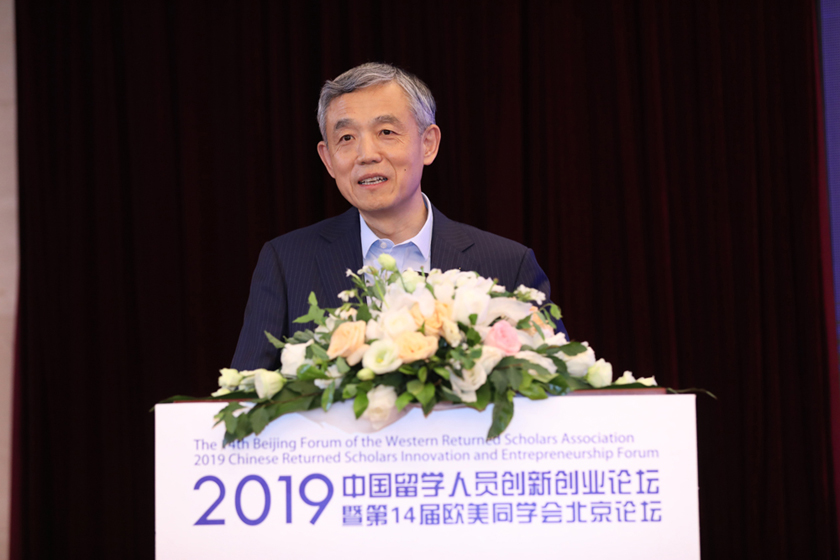
Xue Lan, dean of Schwarzman College, Tsinghua University, emphasized that universities, research institutes, multinational corporations and national agencies are essential to improve the international competence of a country.
Xue suggested that Chinese universities should strive to cultivate international talent. Chinese enterprises should absorb more research talent that understands local culture, economy and society. The state should make more efforts to send Chinese talent who are rooted in Chinese culture and understood the international system to international organizations.
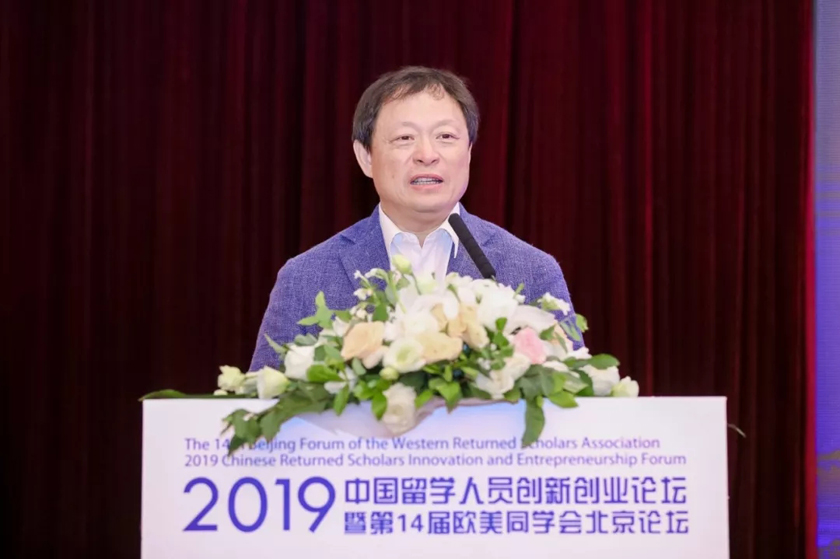
Wang Junfeng, global chairman of King & Wood Mallesons and president of the All China Lawyers Association, shared four points from personal insights and experience. First, overseas returnees should keep learning, which would help them to face challenges in the new era. Second, it is important for entrepreneurs to understand the close links between their careers and the development of the nation. Third, international students should remain modest to gain more understanding of foreign countries through various ways. Fourth, returnees should continue to improve themselves with a more tolerant and inclusive attitude to meet high expectations set by the public.
Key issues addressed in four plenary sessions
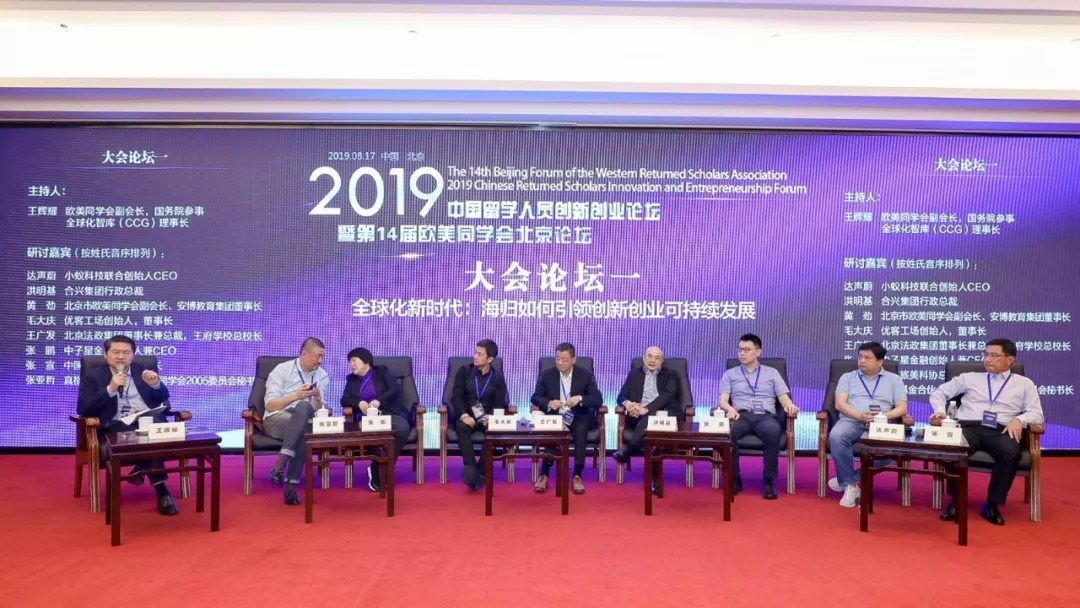
The first plenary session was themed “A new era of globalization: how returnees lead innovation and entrepreneurship for sustainable development.”Participants discussed a variety of topics, such as China’s opportunities for further reform and opening-up, the entrepreneurship and innovation sphere in China, the role of scholars and students returning from overseas studies in promoting sustainable entrepreneurship and innovation as well as global governance.
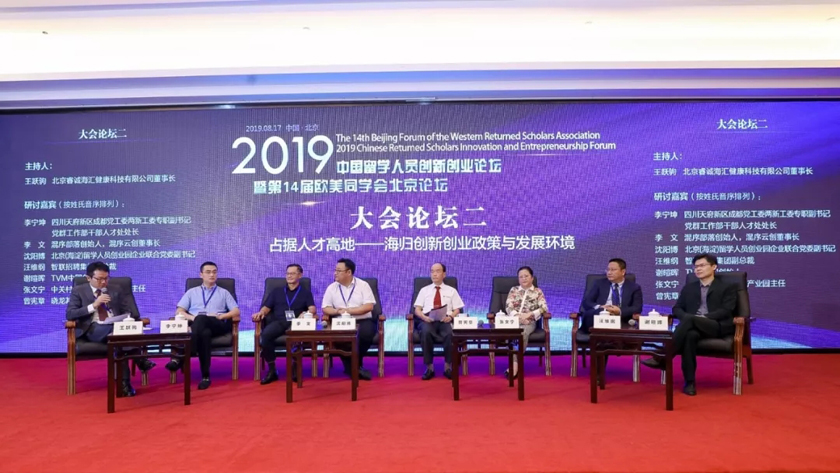
The second plenary session, themed “Building a talent highland- employment policy and the development environment for the returnees”, focused on issues like how to formulate employment policy for returnees, enhance the development environment, and gather strength of talent.
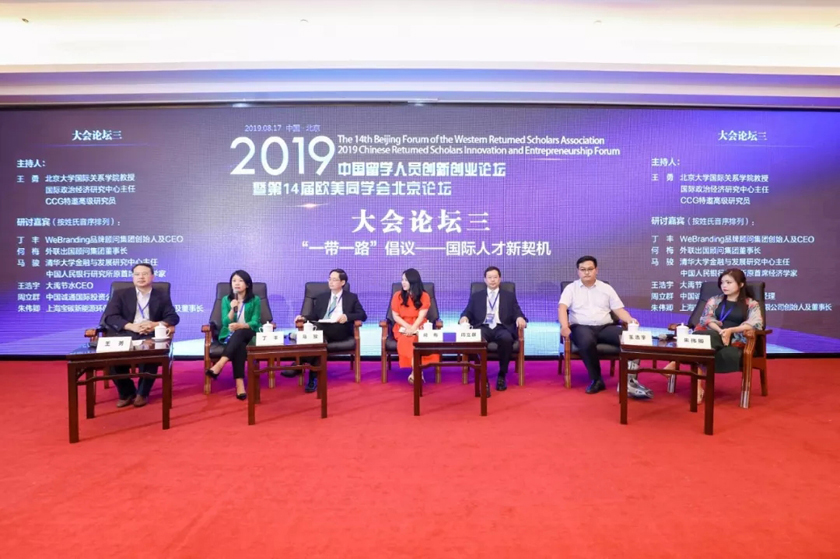
The third plenary session focused on “The Belt and Road Initiative–the new opportunities of international talent” to discuss the role of overseas returnees in building a “community of human destiny”, ways to avoid “the clash of civilizations”, and promote mutual understanding between East and West, as well as explore opportunities under the Belt and Road Initiative.
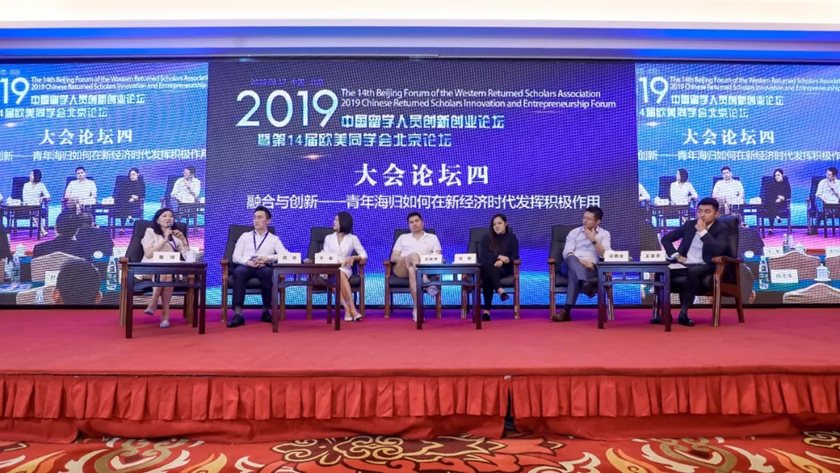
The last plenary session, chaired by CCG Secretary General Miao Lu, was themed “Integration and Innovation–how young returnees play an active role in the new economic era.”Participants discussed with the new generation of entrepreneurs about several topics, including how traditional industries can be innovated in China’s new economic era, how returnees can seize opportunities and face the challenges in a changing world, and how the young returnees can better promote innovation-driven development of China and help Chinese enterprises to go global.
Encouraging international student internship and innovations
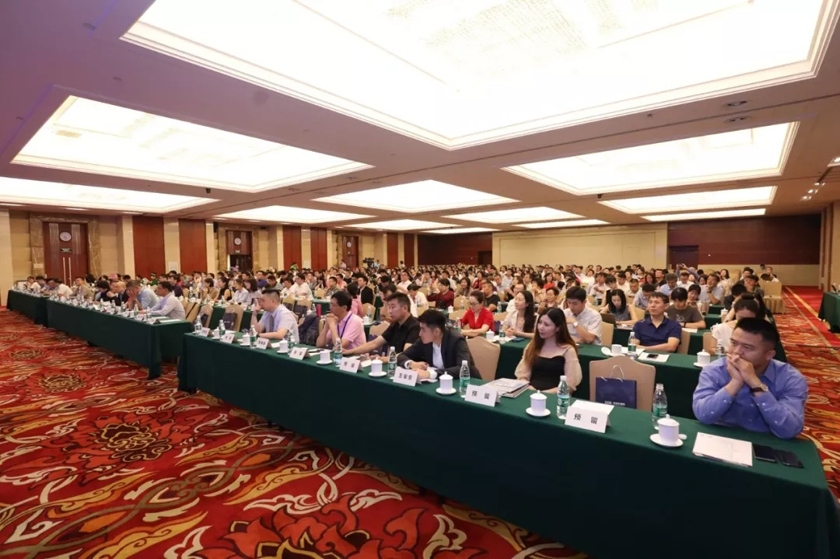
The forum also held a licensing ceremony of the Research Bases for International Student Internship. CCG Secretary-General Miao Lu and the Chairman of the Outreach Advisory Group He Mei awarded the certification to more than ten outstanding enterprises.
The Research Bases for International Student Internship, aiming to recruit,train and recommend outstanding interns and graduates, is jointly sponsored by CCG and the Job Tank.
As a leading Chinese non-government think tank based in Beijing, CCG continues to conduct research on the innovation and entrepreneurship of Chinese returnees to provide suggestions on related areas to support government-related decision-making and institutional innovation.
About Western Returned Scholars Association (Overseas-educated Scholars Association of China)
Established in 1913, Western Returned Scholars Association (WRSA) is a national association of returned Chinese students from overseas under the leadership of the Secretariat of the CPC Central Committee and the guidance of the United-Front Work Department of the CPC Central Committee. Since 2003, it has also been called the Overseas-educated Scholars Association of China. Its founders and early members included such distinguished scholars who returned to China from overseas as Vi Kyuin Koo, Zhou Yichun, Jeme Tien-Yow and Cai Yuanpei.
Committed to patriotism, WRSA organized patriotic and democratic movements and devoted itself to the cause of national salvation and people’s liberation since its inception. In recent years, WRSA has been working hard to follow through with what President Xi said in his 100th anniversary speech by turning itself into a talent pool in the service of the country, a think tank of good ideas and proposals and a vital force in people-to-people diplomacy.
The Western Returned Scholars Association (Overseas-educated Scholars Association of China) has 42 local organizations, two institutional members, and 15 national chapters. It keeps in close contact with more than 100 associations of Chinese scholars overseas in major destination countries for Chinese students.





